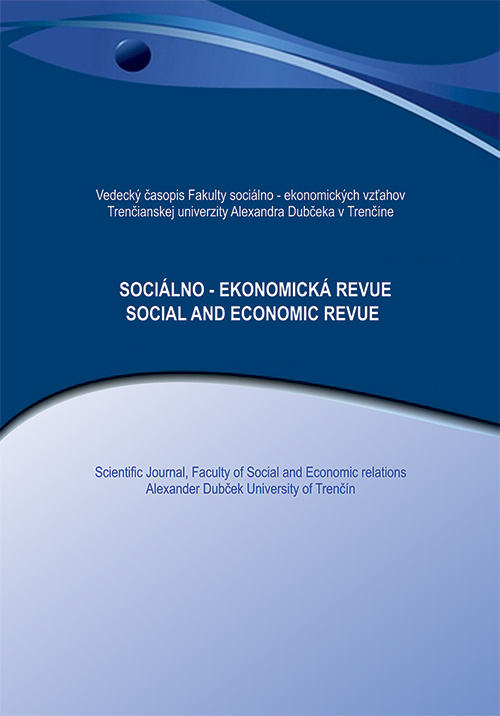THE DIFFERNCES IN ORGANIZATION OF RISK MANAGEMENT BETWEEN SLOVAK AND POLISH SMEs
Nowadays SMEs are facing number of factors that undermine their business and financial results. These factors are the source of risks and due this fact, the organization of risk management becomes more and more significant. The main aim of the paper is to compare two basic characteristics of risk management between Slovak and Polish SMEs. Within the comparison, we focused on responsibilities of risk management and the level of the risk perception. To achieve the main aim, the questionnaire surveys in both countries were carried out. We found out, that in both countries, the responsibility for risk management in SMEs lies on owners and SMEs perceive the risks. The results of the paper contribute to the wide spreading of risk management context in SMEs.
Vydanie: 2019/2 Strany: 60-69 Klasifikácia JEL: L25, L26, G32
DOI:
Kľúčové slová: Small and medium enterprises, risk management, responsibility, risk perception, risk identification.
Sekcia: SOCIAL ASPECTS OF MANAGEMENT
Kontakty:
Katarína Havierniková, Ing., PhD.,
Department of Economy and Economics,
Faculty of Social and Economic Relations,
Alexander Dubček University of Trenčín
Študentská 3, 911 50 Trenčín, Slovakia,
e-mail: katarina.haviernikova@tnuni.sk
Małgorzata Okręglicka PhD.
Department of Economics, Investments and Real Estate,
Faculty of Management,
Czestochowa University of Technology
Dąbrowskiego 69, 42-201 Częstochowa, Poland,
e-mail: malgorzata.okreglicka@pcz.pl
Literatúra:
Belás, J., Ivanová, E., Rózsa, Z., & Schonfeld, J. (2018). Innovations in SME segment: Important factors and differences in the approach by size and age of the company. Transformations in Business & Economics.
Borrego, M., Douglas, E. P., & Amelink, C. T. (2009). Quantitative, qualitative, and mixed research methods in engineering education. Journal of Engineering education, 98 (1), 53-66.
Borowiecki R., Siuta-Tokarska B. (2008). Problemy funkcjonowania i rozwoju małych i średnich przedsiębiorstw w Polsce, Warszawa: Difin.
Filip P., Grzebyk M., Kaliszczak L. (2010). Development of the small and medium enterprises in Poland in comparison with European Union member states, Rzeszów: Wydawnictwo Uniwersytetu Rzeszowskiego. Monografie i Opracowania, 10.
Gorzen-Mitka, I. (2018). Leading markers of risk culture in organization. European Journal of Sustainable Development, 7(1), 425-434. (article in journal)
Hudáková, M., Buganová, K., Mika, T., Masár, M. (2019). Manažment rizík malých a stredných podnikov. Žilina: EDIS – vydavateľské centrum ŽU. 202 p.
Ključnikov, A., Mura, L., Sklenár, D. (2019). Information security management in SMEs: factors of success. Entrepreneurship and Sustainability Issues 6(4): 2081-2094. https://doi.org/10.9770/jesi.2019.6.4(37)
Klučka J. (2006). Plánovaní a riziko, Moderní řízení, vol.7, pp.37-38.
Klučka J. (2010). Enterprise Risk Management and Economic Crisis in the Slovak Republic, Management 2010, Union University, Belgrade, pp.33.)
Korombel A. (2012), Enterprise risk management in practice of Polish small businesses - own research results. 7th International Scientific Conference on Business and Management, Vilnius Gediminas Technical University, Vilnius, 1137-1143.
Krajnakova E., Navikaite A., Navickas V. (2015). Paradigm Shift of Small and Medium-Sized Enterprises Competitive Advantage to Management of Customer Satisfaction, Inzinerine Ekonomika-Engineering Economics, vol. 26(3), pp. 327-332.
Kraľova, K. (2018) Industry 4.0 and Small and Medium Enterprises. Vplyv Industry 4.0 na tvorbu pracovnych miest. Trenčín: FSEV, TnUAD, pp. 125-129.
Kramarova, K. (2016). Theoretical Basis of Credit Risk Management in Export Transactions. Lecture Notes in Management Science Volume 66, 8. Myšková, R., & Doupalová, V. (2015). Approach to risk management decision-making in the small business. Procedia Economics and Finance, 34, 329-336.
Lemańska-Majdzik A. (2018). Flexible Activities of the Organization in Implementation of the Sustainable Development Principles in Selected Areas of the Organizations, European Journal of Sustainable Development. 7 (4), 212-222..
Mynarzová, M. (2018). Public support to small and medium-sized enterprises in European Union through the prism of modernized general block exemption regulation. In: 16th International Scientific Conference on Economic Policy in European Union Member Countries 235-243.
Pakosta, J. & Činčalová, S., & Pátek, J. (2017). Valuation of Intangible Assets. Hradec Economic Days. University of Hradec Králové, 662-672.
Peráček, T., Nosková, M., Mucha, B. (2017). Selected issues of Slovak business environment. Economic and social development (esd): Managerial issues in modern business. Book Series: International Scientific Conference on Economic and Social Development, 254-259.
Rohrmann, B. (2008, June). Risk perception, risk attitude, risk communication, risk management: A conceptual appraisal. In 15th Internaional Emergency Management Society (TIEMS) Annual Conference. [on-line] [cit.: 2019-15-01]. http://tiems.info/dmdocuments/events/TIEMS_2008_Bernd_Rohrmann_ Keynote.pdf)
Sipa, M. (2017). Innovation as a key factors of small business competition. European Journal of Sustainable Development, 6(1), 344-356.
Ward, S., & Chapman, C. (2003). Transforming project risk management into project uncertainty management. International Journal of Project management, 21(2), 97-105.


